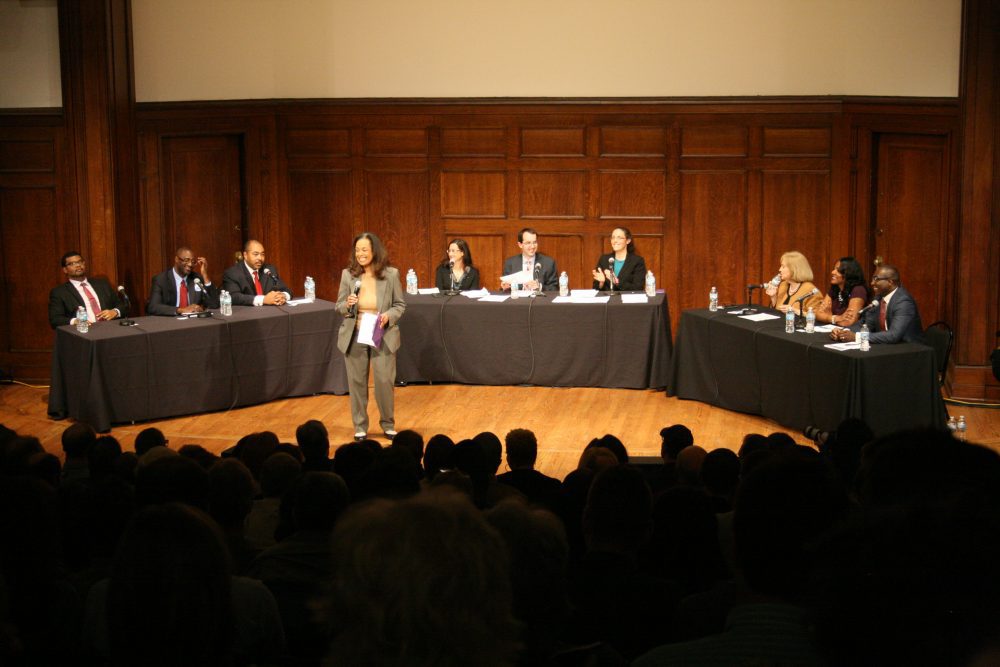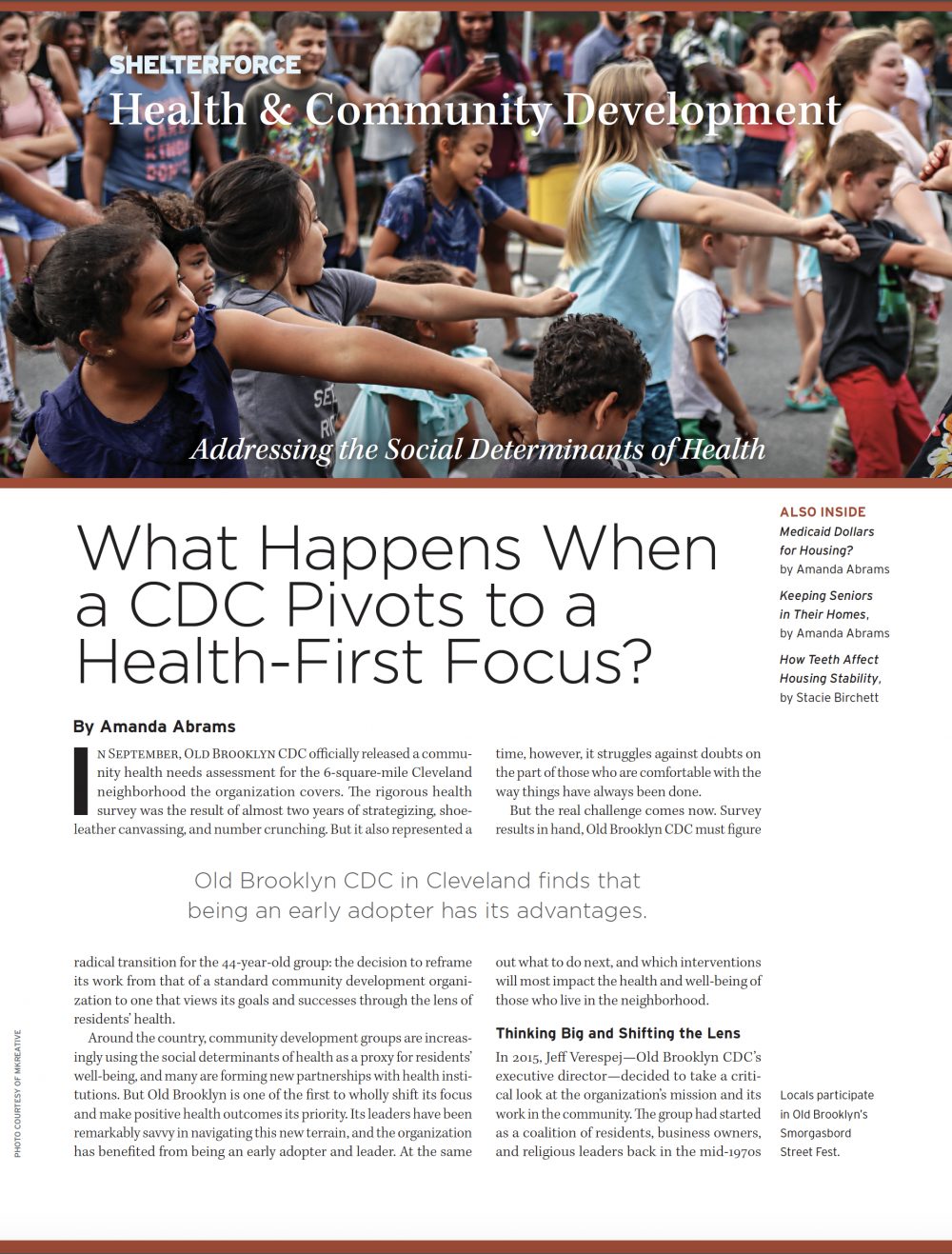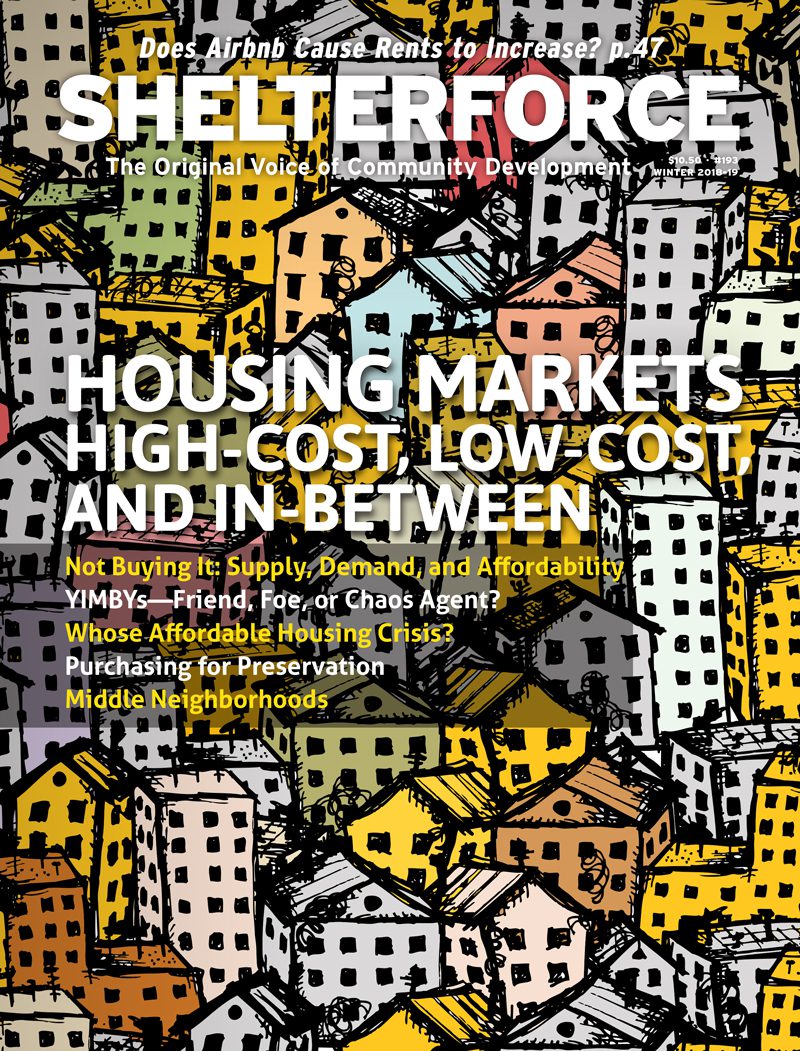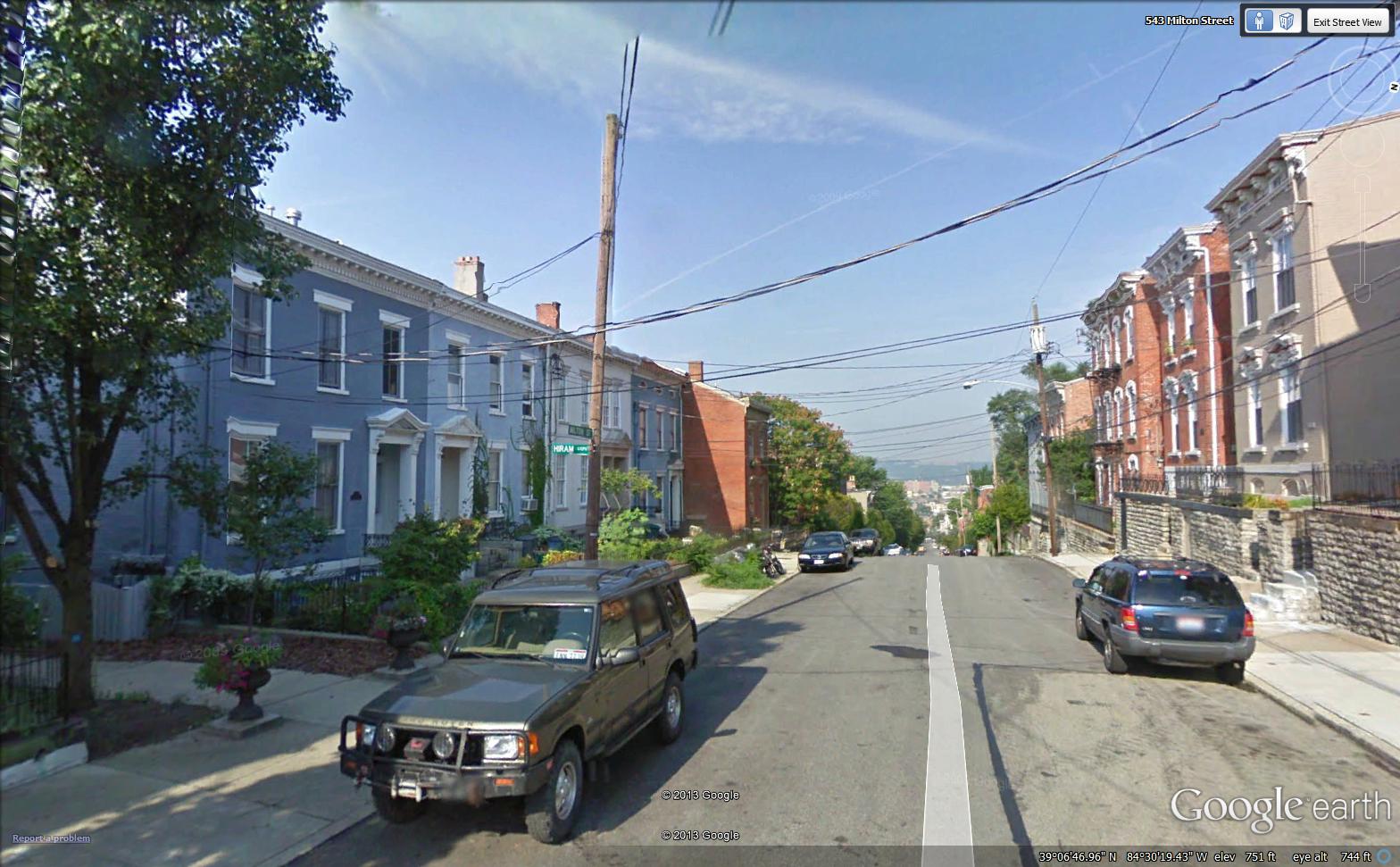
St. Louis mayoral candidates gather for a forum led by the Social Policy & Electoral Accountability Collaborative. Photo courtesy of the Community Builders Network of Metro St. Louis
Tired of hearing the standard rhetoric from our elected officials—promises of lowering the crime rate, easing the tax burden, and repairing potholes—a group of organizations in St. Louis banded together and partnered with local media to ensure that racial equity was the central topic of political debate during the city’s 2017 mayoral race.
A Once-in-a-Decade Opportunity
In 2016 St. Louis City Mayor Francis Slay announced he would not run for re-election. After a historic four terms, this created an opportunity for mayoral candidates to shape new visions for St. Louis.
Among the 10 most segregated metropolitan regions in the country, St. Louis often simmers with unease from decades of racial inequity. In the summer of 2014, an African-American man, 18-year-old Michael Brown, was fatally shot by a police officer in nearby Ferguson. Many St. Louis residents and taxpayers were deeply disappointed in the way city officials responded to the unrest in Ferguson, which crossed into the city’s boundaries. It was clear that this was a critical election year.
Community members and organizations wanted more than just the typical rhetoric from city leaders. There was a need to ensure that community voices and expectations were heard. There was a need to understand how the candidates planned to address inequities in the city and whether they were willing to take a hard stance—publicly—on equity issues important to St. Louis residents, businesses, faith communities, and nonprofits.
To prepare, a group of 10 local organizations focused on systemic change joined together to encourage candidates to address racial equity and make it a focal point in the pivotal election. The group first set its sights on hosting a mayoral forum that would be different from past forums by focusing on racial equity. The group eventually evolved into the Social Policy & Electoral Accountability Collaborative (SPEAC).
The Ferguson Commission Report as an Organizing Principle
To prepare for the mayoral forum, the 10 organizations had to first agree on regional priorities. The group was fortunate enough to have a 204-page document produced by the Ferguson Commission, a governor-appointed special task force created to address the sources of the unrest in Ferguson after the killing of Brown. The 16-member volunteer commission consisted of residents, activists, and business leaders from across the St. Louis region. Their final report concluded 10 months of intensive research and public meetings exploring the systemic root causes of the unrest. The group heard from more than 3,000 community members who engaged, shared, argued, and reported personal experiences of racism and inequity. The testimony helped build the commission’s final report, Forward Through Ferguson, a Path Toward Racial Equity.
The report’s recommendations were comprehensive in scope, spanning education, courts, housing, transportation, policing, and more. Together they represented a community road map for implementing policy and systems changes that could drastically reduce persistent racial disparities. The report ultimately shared a vision of a region in which everyone had the opportunity to thrive.
The report was the road map, but it rested on governments, institutions, businesses, and organizations across the region to drive the change needed to achieve its critical recommendations.
The Power of a Shared Policy Agenda
Although SPEAC was bound by the belief that an equity voice was missing from major local elections, the group had challenges with its own cohesion because of the variety of disparate social causes among its member organizations. Some groups focused exclusively on environmental issues. Others were proponents of community development. Still others focused on civic engagement, education, health, justice reform, child well-being, and transportation access.
To bridge those varying policy commitments, the group repeatedly referred to the Forward Through Ferguson report and decided to view it like a taxonomy—a classification of often overlapping and intersecting systems that needed to be dealt with both individually and as a whole to create the changes needed in St. Louis. It became apparent that using the Forward Through Ferguson report as the guiding framework for the forum was the best way to ensure that regional priorities were addressed. The report’s main tenets—Youth at the Center, Opportunity to Thrive, and Justice for All—encompassed a variety of regional issues and made recommendations for improving systems related to items including education infrastructure reform, access to affordable health care, housing, and police and court reform, among others.
Once each member organization understood how their policy priorities were contained in the report, the group quickly reached consensus on using the report to create a common agenda for the coalition. SPEAC agreed that this report was the foundation for equity in the region, and it could not be allowed to be ignored by political candidates. It could not sit on the shelf and gather dust, as so many other regional reports have done.
Within the Forward Through Ferguson report there are 189 recommendations, or calls to action. With limited time at a mayoral forum, the group knew the two-hour forum couldn’t address all of the issues. To arrive at the most important policies for the region, SPEAC members narrowed the calls to action using a process similar to the one the Ferguson Commission used. The group surveyed members to identify the priorities in each part of the Forward Through Ferguson report that were most:
- Is the policy call to action innovative? Will it create an impact or cause positive change?
- Will this policy call to action address pressing issues?
- Does the policy present solutions that address root causes and call out core issues in the region?
After everyone was surveyed, the results were used to determine the priority issues for the forum. For example, the results in the “Opportunity to Thrive” section surfaced policies about inclusive and affordable housing, key transportation projects, development incentive reform, and workforce equity as the top priorities.
Make no mistake: getting everyone on the same page took a considerable amount of time and effort—far more than planning the actual logistics of a large mayoral forum. Although some members thought the process was cumbersome, it prevented future disagreements about the direction of the group.
“Although our project focuses specifically on health disparities among African Americans, health wasn’t discussed at the mayoral forum,” said one SPEAC member. “However, that was OK with us; we understand the social determinants of health and knowing that the other groups around the table are all working towards a more equitable region made it easy for us to accept the forum’s agenda. Seeing that everyone is working on their piece of the equity puzzle demonstrates the effort that our region is taking to address equity holistically. Being part of SPEAC also provided a platform for further coordination of our efforts.”
The final policy agenda united the member organizations in an empowering way. The group had a solid cross-issue agenda tied together by an imperative for elected officials to address long-standing racial inequities. This unified platform enabled SPEAC to present highly effective questions at the mayoral forum that forced candidates to go on the record with their opinions and their support or opposition of key policies.
The first question to the candidates grounded the forum in SPEAC’s shared-equity agenda. Candidates were asked about their understanding of a racial equity lens, and to reflect on the privileges they’ve had throughout their lives and how those privileges shaped their understanding of the world.
Other questions addressed more specific issues. For example, as a response to the shortage of market-rate housing units available to low-income families, widespread housing cost burden, and the proliferation of vacancies in St. Louis, the Forward Through Ferguson report urges the optimization of existing housing supports, including Section 8 Housing Choice Vouchers, Low-Income Housing Tax Credits, and Housing Trust Funds at both the local and state levels. One specific call to action under this section includes a recommendation that the City of St. Louis expand funding for its Affordable Housing Trust Fund (AHTF) above the mandated $5 million minimum.
Several questions addressed these issues directly, and pressed four of the candidates—all then-current members of the City of St. Louis Board of Aldermen—to talk about a conflict of priorities between the AHTF and a proposed soccer stadium that would have dipped into the same tax revenue used to fund the AHTF. The candidates were asked why they voted for or against a bill that established the funding structure for the stadium, and how their decision impacted affordable housing opportunities.
All four candidates challenged the notion that the stadium would negatively impact the AHTF. These answers—and others—helped shape SPEAC’s post-forum advocacy strategies, which have sought to hold elected officials accountable to the communities they represent.
The Glue that Holds Democracy Together
A healthy local democracy provides residents with the right to interact with those who seek to represent their community in public office. This holds a democracy together: a genuine belief that elected representatives and public institutions will take resident viewpoints and needs into account in a genuine, substantive way when they craft policy and make decisions. Without the foundation of accountability, transparency, and trust, democracy can’t exist.
SPEAC wants to make sure that this foundation for democracy exists—and, more importantly, that “democracy” in St. Louis truly means “government by the people.” All of the people.
The mayoral forum was just the beginning of SPEAC’s work. Once the group had the candidates’ answers, there was a better understanding of which candidates were truly aligned with an equity platform, and which might not be. From there, the group’s focus shifted to include advocacy, which will be explored in a future article at shelterforce.org.





Comments